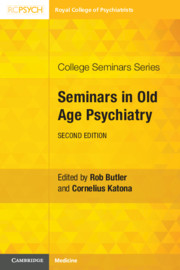Book contents
- Seminars in Old Age Psychiatry
- College Seminars Series
- Seminars in Old Age Psychiatry
- Copyright page
- Contents
- Contributors
- Preface
- Note
- Chapter 1 Healthy Ageing
- Chapter 2 Clinical Assessment
- Chapter 3 Cognitive Assessment
- Chapter 4 Imaging
- Chapter 5 Delirium
- Chapter 6 Alzheimer’s Disease
- Chapter 7 Vascular Dementia
- Chapter 8 Dementia with Lewy Bodies
- Chapter 9 Frontotemporal Dementia
- Chapter 10 Depression
- Chapter 11 Bipolar Disorder
- Chapter 12 Psychosis
- Chapter 13 Anxiety Disorders
- Chapter 14 Drug and Alcohol Misuse
- Chapter 15 Attention Deficit Hyperactivity Disorder
- Chapter 16 Medications
- Chapter 17 Electroconvulsive Therapy and Neurostimulation
- Chapter 18 Psychological Therapies
- Chapter 19 Role of an Old Age Psychiatrist
- Chapter 20 Consultation-Liaison
- Chapter 21 Palliative Care
- Chapter 22 Care Homes
- Chapter 23 Carers
- Chapter 24 Law, Capacity and Ethics
- Chapter 25 Migrants, Refugees and Asylum Seekers
- Chapter 26 Clinical Scenarios
- Index
- References
Chapter 3 - Cognitive Assessment
Published online by Cambridge University Press: 21 June 2019
- Seminars in Old Age Psychiatry
- College Seminars Series
- Seminars in Old Age Psychiatry
- Copyright page
- Contents
- Contributors
- Preface
- Note
- Chapter 1 Healthy Ageing
- Chapter 2 Clinical Assessment
- Chapter 3 Cognitive Assessment
- Chapter 4 Imaging
- Chapter 5 Delirium
- Chapter 6 Alzheimer’s Disease
- Chapter 7 Vascular Dementia
- Chapter 8 Dementia with Lewy Bodies
- Chapter 9 Frontotemporal Dementia
- Chapter 10 Depression
- Chapter 11 Bipolar Disorder
- Chapter 12 Psychosis
- Chapter 13 Anxiety Disorders
- Chapter 14 Drug and Alcohol Misuse
- Chapter 15 Attention Deficit Hyperactivity Disorder
- Chapter 16 Medications
- Chapter 17 Electroconvulsive Therapy and Neurostimulation
- Chapter 18 Psychological Therapies
- Chapter 19 Role of an Old Age Psychiatrist
- Chapter 20 Consultation-Liaison
- Chapter 21 Palliative Care
- Chapter 22 Care Homes
- Chapter 23 Carers
- Chapter 24 Law, Capacity and Ethics
- Chapter 25 Migrants, Refugees and Asylum Seekers
- Chapter 26 Clinical Scenarios
- Index
- References
Summary
Cognition refers to a set of mental actions or processes by which we create, use or store knowledge. We can conceptualise a global measure of overall cognitive ability, however, it is possible to distinguish a range of individual components or core cognitive domains. This is informative as cognitive disorders often selectively affect some functions, while sparing others. As well as providing diagnostic help, cognitive assessment can be valuable in monitoring progression or improvement of a disorder. It is particularly powerful used in combination with information from clinical interview and measurement of biomarkers (e.g., through brain imaging, or cerebrospinal fluid [CSF] examination).
- Type
- Chapter
- Information
- Seminars in Old Age Psychiatry , pp. 27 - 40Publisher: Cambridge University PressPrint publication year: 2019



